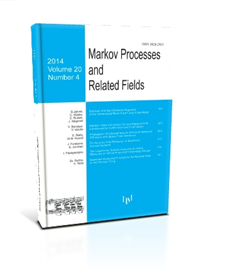Linear Dissipative Force as a Result of Discrete Time Collisions
V. Goriachkin, T.S. Turova
2020, v.26, Issue 2, 315-337
ABSTRACT
We consider two models: one describes the particle movement under the influence of external force and friction, and another one describes the movement of a particle, which is acted upon by the same external force but it additionally collides with other particles of much lighter masses.
We establish conditions for these two
models to be equivalent in some sense. We also
considered deterministic and stochastic models for collisions, in first case assuming that the time intervals between the collisions are constant, and in another case when these intervals are random independent random variables.
For various examples of the external force
we
find parameters which yield asymptotic equivalence of
the velocities of the particle in different models. We also provide conditions whe
n the trajectories of the particles in different models are close to each other in the Chebyshev norm over a certain finite period of time.
Our results confirm that a linear dissipative force such as e.g., friction, can well be
modelled by the
collisions with external light particles if their masses and the time-intervals between the collisions satisfy certain condition. The latter is proved here to be universal for
different forms of the external force.
Keywords: dissipative force, friction, particles collision, Euler's approximation method
COMMENTS
Please log in or register to leave a comment

